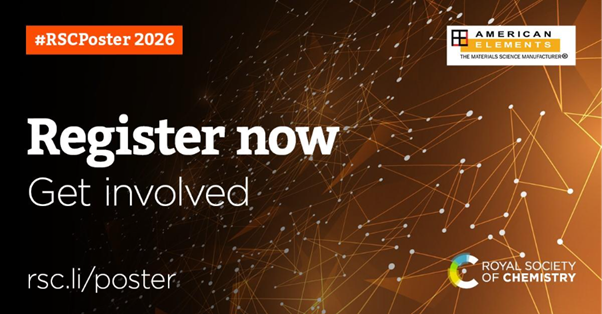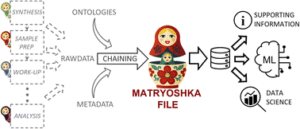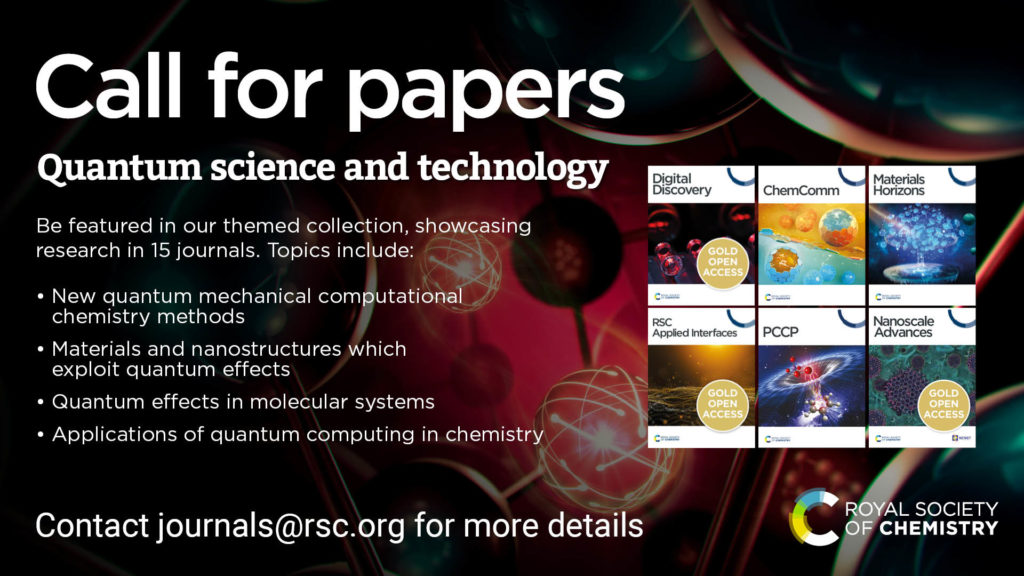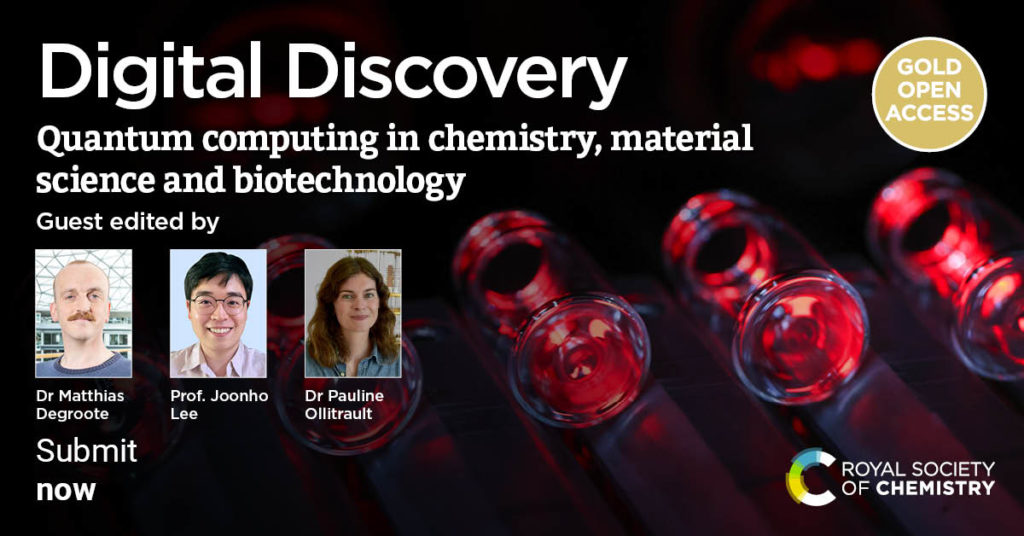We’re pleased to announce that a new themed collection from Digital Discovery has now been published online.
Read the collection

This new themed collection represents a collaboration between the editors of Digital Discovery and the Acceleration Consortium, organisers of the Accelerate Conference. The goal of the conference was to explore the power of self-driving labs (SDLs), which combine AI, automation, and advanced computing to accelerate materials and molecular discovery.
This themed collection, Guest Edited by Prof. Janine George (Federal Institute for Materials Research and Testing (BAM) and Friedrich Schiller University Jena, Germany), Prof. Claudiane Ouellet-Plamondon (École de Technologie Supérieure, Canada) and Prof. Kristofer Reyes (University at Buffalo, United States), features contributions that cover various aspects of this process, whether specifically presented at the conference or not.
The papers span innovations in algorithms, decision-making, and integrated self-driving laboratories—from efficient experimental design and probabilistic programming to orchestration frameworks coordinating sensing, actuation, and learning. Collectively, they illustrate new principles for accelerating and scaling discovery.
The articles from this collection have been provided below. All articles in Digital Discovery are open access and free to read.
A new collection to feature contributors to Accelerate Conference 2025 is currently underway, and we look forward to sharing further information in the near future.
Editorial
Introduction to the “Accelerate Conference 2023–2024” themed collection
Janine George, Claudiane Ouellet-Plamondon and Kristofer Reyes
Digital Discovery, 2026, 5, DOI: 10.1039/D5DD90057C
Opinion
Linda Hung, Joyce A. Yager, Danielle Monteverde, Dave Baiocchi, Ha-Kyung Kwon, Shijing Sun and Santosh Suram
Digital Discovery, 2024, 3, 1273-1279, DOI: 10.1039/D4DD00059E
Review
Democratizing self-driving labs: advances in low-cost 3D printing for laboratory automationSayan Doloi, Maloy Das, Yujia Li, Zen Han Cho, Xingchi Xiao, John V. Hanna, Matthew Osvaldoa and Leonard Ng Wei Tat
Digital Discovery, 2025, 4, 1685-1721, DOI: 10.1039/D4DD00411F
Tutorial Review
Stanley Lo, Sterling G. Baird, Joshua Schrier, Ben Blaiszik, Nessa Carson, Ian Foster, Andrés Aguilar-Granda, Sergei V. Kalinin, Benji Maruyama, Maria Politi, Helen Tran, Taylor D. Sparks and Alán Aspuru-Guzik
Digital Discovery, 2024, 3, 842-868, DOI: 10.1039/D3DD00223C
Communication
Stability and transferability of machine learning force fields for molecular dynamics applications
Salatan Duangdangchote, Dwight S. Seferos and Oleksandr Voznyy
Digital Discovery, 2024, 3, 2177-2182, DOI: 10.1039/D4DD00140K
Papers
Autonomous organic synthesis for redox flow batteries via flexible batch Bayesian optimization
Clara Tamura, Heather Job, Henry Chang, Wei Wang, Yangang Liang and Shijing Sun
Digital Discovery, 2025, 4, 2737-2751, DOI: 10.1039/D5DD00017C
André Colliard-Granero, Kangjun Duan, Roswitha Zeis, Michael H. Eikerling, Kourosh Malek and Mohammad J. Eslamibidgoli
Digital Discovery, 2025, 4, 2724-2736, DOI: 10.1039/D5DD000158G
Jiaru Bai, Simon D. Rihm, Aleksandar Kondinski, Fabio Saluz, Xinhong Deng, George Brownbridge, Sebastian Mosbach, Jethro Akroyd and Markus Kraft
Digital Discovery, 2025, 4, 123-2135, DOI: 10.1039/ D5DD00069F
BayBE: a Bayesian Back End for experimental planning in the low-to-no-data regime
Martin Fitzner, Adrian Šošić, Alexander V. Hopp, Marcel Müller, Rim Rihana, Karin Hrovatin, Fabian Liebig, Mathias Winkel, Wolfgang Halter and Jan Gerit Brandenburg
Digital Discovery, 2025, 4, 1991-2000, DOI: 10.1039/D5DD00050E
Atomate2: modular workflows for materials science
Alex M. Ganose, Hrushikesh Sahasrabuddhe, Mark Asta, Kevin Beck, Tathagata Biswas, Alexander Bonkowski, Joana Bustamante, Xin Chen, Yuan Chiang, Daryl C. Chrzan, Jacob Clary, Orion A. Cohen, Christina Ertural, Max C. Gallant, Janine George, Sophie Gerits, Rhys E. A. Goodall, Rishabh D. Guha, Geoffroy Hautier, Matthew Horton, T. J. Inizan, Aaron D. Kaplan, Ryan S. Kingsbury, Matthew C. Kuner, Bryant Li, Xavier Linn, Matthew J. McDermott, Rohith Srinivaas Mohanakrishnan, Aakash N. Naik, Jeffrey B. Neaton, Shehan M. Parmar, Kristin A. Persson, Guido Petretto, Thomas A. R. Purcell, Francesco Ricci, Benjamin Rich, Janosh Riebesell, Gian-Marco Rignanese, Andrew S. Rosen, Matthias Scheffler, Jonathan Schmidt Jimmy-Xuan Shen, Andrei Sobolev, Ravishankar Sundararaman, Cooper Tezak, Victor Trinquet, Joel B. Varley, Derek Vigil-Fowler, Duo Wang, David Waroquiers, Mingjian Wen, Han Yang, Hui Zheng, Jiongzhi Zheng, Zhuoying Zhu and Anubhav Jain
Digital Discovery, 2025, 4, 1944-1973, DOI: 10.1039/D5DD00019J
Yuchao Tang, Bin Xiao, Shuizhou Chen, Quan Qian and Yi Liu
Digital Discovery, 2025, 4, 1870-1883, DOI: 10.1039/D5DD00079C
SynCoTrain: a dual classifier PU-learning framework for synthesizability prediction
Sasan Amariamir, Janine George and Philipp Benner
Digital Discovery, 2025, 4, 2737-2751, DOI: 10.1039/D4DD00394B
Large language models for knowledge graph extraction from tables in materials science
Max Dreger, Kourosh Malek and Michael Eikerling
Digital Discovery, 2025, 4, 1221-1231, DOI: 10.1039/D4DD00362D
ADEL: an automated drop-cast electrode setup for high-throughput screening of battery materials
Maha Ismail, Maria Angeles Cabañero, Joseba Orive, Lakshmipriya Musuvadhi Babulal, Javier Garcia, Maria C. Morant-Miñana, Jean-Luc Dauvergne, Francisco Bonilla, Iciar Monterrubio, Javier Carrasco Amaia Saracibarb and Marine Reynaud
Digital Discovery, 2025, 4, 943-953, DOI: 10.1039/D4DD00381K
Alexander E. Siemenn, Basita Das, Eunice Aissi, Fang Sheng, Lleyton Elliott, Blake Hudspeth, Marilyn Meyers, James Serdy and Tonio Buonassisi
Digital Discovery, 2025, 4, 896-909, DOI: 10.1039/D4DD00249K
Opentrons for automated and high-throughput viscometry
Beatrice W. Soh, Aniket Chitre, Shu Zheng Tan, Yuhan Wang, Yinqi Yi, Wendy Soh, Kedar Hippalgaonkar and D. Ian Wilson
Digital Discovery, 2025, 4, 711-722, DOI: 10.1039/D4DD00368C
James R. Deneault, Woojae Kim, Jiseob Kim, Yuzhe Gu, Jorge Chang, Benji Maruyama, Jay I. Myung and Mark A. Pitt
Digital Discovery, 2025, 4, 723-737, DOI: 10.1039/D4DD00320A
Multi-objective Bayesian optimization: a case study in material extrusion
Jay I. Myung, James R. Deneault, Jorge Chang, Inhan Kang, Benji Maruyama and Mark A. Pitt
Digital Discovery, 2025, 4, 464-476, DOI: 10.1039/D4DD00281D
Arash Khajeh, Xiangyun Lei, Weike Ye, Zhenze Yang, Linda Hung, Daniel Schweigert and Ha-Kyung Kwon
Digital Discovery, 2025, 4, 11-20, DOI: 10.1039/D4DD00293H
Data efficiency of classification strategies for chemical and materials design
Quinn M. Gallagher and Michael A. Webb
Digital Discovery, 2025, 4, 135-148, DOI: 10.1039/D4DD00298A
Agent-based learning of materials datasets from the scientific literature
Mehrad Ansari and Seyed Mohamad Moosavi
Digital Discovery, 2025, 4, 2607-2617, DOI: 10.1039/D4DD00252K
Combining Hammett σ constants for Δ-machine learning and catalyst discovery
Diana Rakotonirina, Marco Bragato, Stefan Heinen and O. Anatole von Lilienfeld
Digital Discovery, 2025, 4, 2487-2496, DOI: 10.1039/D4DD00228H
Leveraging GPT-4 to transform chemistry from paper to practice
Wenyu Zhang, Mason A. Guy, Jerrica Yang, Lucy Hao, Junliang Liu, Joel M. Hawkins, Jason Mustakis, Sebastien Monfette and Jason E. Hein
Digital Discovery, 2024, 3, 2367-2376, DOI: 10.1039/D4DD00248B
Miguel Hernández-del-Valle, Jorge Ilarraza-Zuazo, Enrique Dios-Lázaro, Javier Rubio, Joris Audoux and Maciej Haranczyk
Digital Discovery, 2024, 3, 2032-2041, DOI: 10.1039/D4DD00198B
We hope you enjoy this new themed collection from Digital Discovery.














 His research centres on uncovering reaction mechanisms and structure–performance relationships in molecular synthesis. His group is particularly focused on integrating mechanistic understanding with data-driven approaches — including the development of chemically interpretable molecular graph models and transfer learning methods to overcome small-data limitations in organic chemistry.
His research centres on uncovering reaction mechanisms and structure–performance relationships in molecular synthesis. His group is particularly focused on integrating mechanistic understanding with data-driven approaches — including the development of chemically interpretable molecular graph models and transfer learning methods to overcome small-data limitations in organic chemistry.


